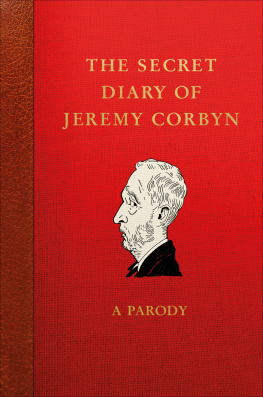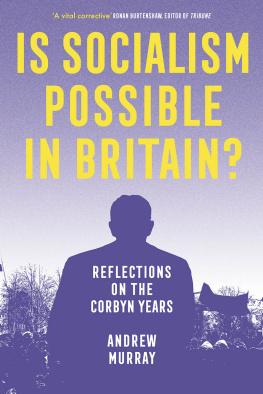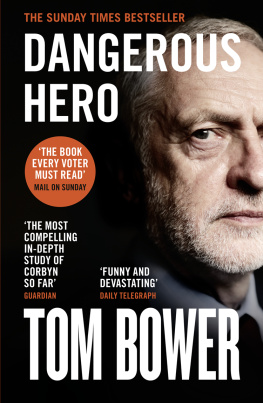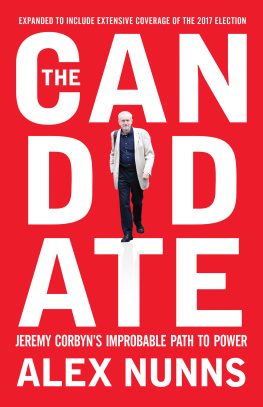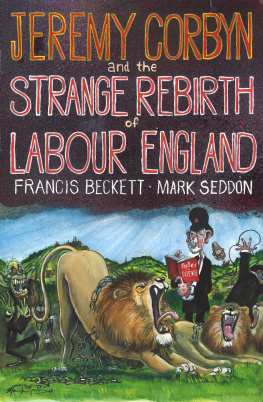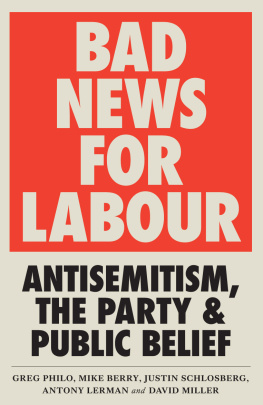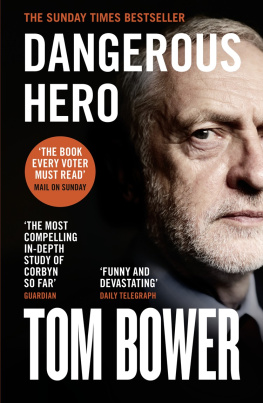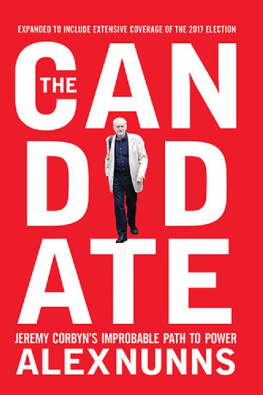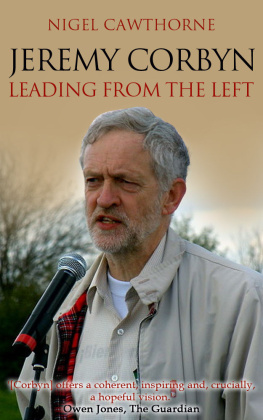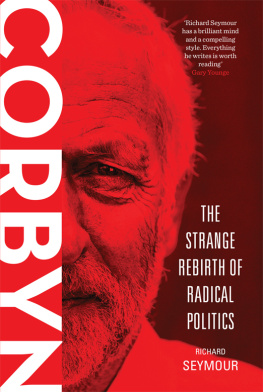I HAD ORIGINALLY PLANNED to call this book Comrade Jeremy. The two words seem to me to capture the perfect paradox of Jeremy Corbyns life: his first name suggests the epitome of the middle-class, middle-aged, former grammar school boy who grew up in ease and privilege amid the pastoral delights of the English Shires. And yet from his early teens, the man who is now Labour leader has devoted himself to the international socialist class struggle, the causes and values of the left. As time went on, however, and Corbyns ascent to the leadership became first a possibility then a probability and finally a reality, events overtook me. It was Comrade Corbyn, rather than Comrade Jeremy, that seemed to have gained traction on Twitter and elsewhere. The people had spoken. The title was changed. As this book recounts, it is by no means the first time during the story of Jeremy Corbyns rise to power that best-laid plans have been overthrown by the whirlwind of social media surrounding him.
The books subtitle (a reference to Chris Mullins 1982 novel A Very British Coup) highlights the most unexpected nature of Corbyns victory. When he entered the Labour leadership race in the spring of 2015, it seemed doubtful he would receive enough nominations from his fellow MPs to make it on to the ballot, let alone emerge triumphant from the contest three months later. The story of how Corbyn stormed the barricades of New Labour to capture his party while inspiring a new mass movement of energised and excited left-wing Corbynistas is as unlikely and as gripping as any plot a novelist could have dreamed up.
Corbyn is uneasy about any examination of his past, and uncomfortable with what he views as intrusive interest in his personal life. He did not cooperate with this book, and initially discouraged his friends and family from speaking to me. Like his mentor Tony Benn, Corbyn believes that the personal is irrelevant; the political is everything. But as one of my interviewees said to me, Benn espoused this view while establishing one of the greatest personality cults of the last century. Corbyn too now finds himself a leader (unlike Benn, an elected one), and it is little surprise that his many followers as well as those who have their doubts want to find out more. This book attempts to answer some of their questions, and seeks to explain the extraordinary events of the summer of 2015, when a rank outsider from the far Labour left swept to the leadership of one of Britains great parties. The personal is political.
In writing this account, I have not sought to create a hagiography, but nor is it a hatchet job; it is a first attempt to understand and define the phenomenon that is Labour leader Jeremy Corbyn. In the course of my research, I have come to see him as a complex figure, with a clear thread running through his life. From the young activist who had to be persuaded to stand as an MP, to the dedicated campaigner who only gradually assumed the role of left-wing figurehead, to the political veteran who took weeks to agree to enter the 2015 leadership contest, Corbyn likes to be seen as a reluctant, almost unambitious figure who has had greatness thrust upon him. The man who emerges from these pages is, however, far more than an accidental hero. Once Corbyn accepts a challenge, he seizes it and fights to the very last: a formidable, uncompromising operator lurks beneath his gentle demeanour. This, then, is Comrade Corbyn.
If Corbyn himself was unwilling to be interviewed, I have been extremely fortunate in the large numbers of people from all stages of his life, from family and schoolfriends to fellow MPs and political activists, foes as well as fellow travellers, who have agreed to participate in this book, with interviews given both on and off the record. For ease of reference, it should be assumed that unless otherwise attributed all quotes are taken from interviews conducted during the course of the summer and autumn of 2015. This applies equally to quotes which appear anonymously. To help the flow of the narrative, when referring to members of the House of Lords I have tended to use first names rather than titles for politicians who are rather better known by the former. I hope their Lordships will forgive me.
I am grateful to all the many people who generously gave up their time and memories. I would also like to thank the team at Biteback Publishing, particularly Iain Dale, James Stephens and Olivia Beattie for taking on this project and turning it around with the (crazy) speed we felt necessary to meet the thirst to know more about Corbyn. Thanks too to my agent, Victoria Hobbs from AM Heath; everyone at the Telegraph, especially Chris Evans, Robert Winnett, Robert Mendick and Kate Mayer; Bobbie Gillespie, for his kindness in sharing his research; Matthew Bell and Matthew Tempest.
My warmest thanks and love too to my family, Beth, Nick, Linda, Clara, Anya, Stephen and Laurie, for their patience and many kindnesses, with special thanks to my husband, Conor, and father, Peter, early and sage readers..
R OSA P RINCE,
D ECEMBER 2015
12 SEPTEMBER 2015
T HE LAST TIME I had stepped inside the concrete and glass of Westminsters Queen Elizabeth II Conference Centre it had been as a reporter to hear Tony Blair defend himself at the Iraq Inquiry, the seemingly interminable public investigation into the 2003 toppling of Saddam Hussein and invasion of Iraq. Now, five and a half years later, I was back, this time to watch Blairs nemesis Jeremy Corbyn, the man who helped found the Stop the War Coalition and called for the former Prime Minister to be impeached, crowned his successor as Leader of the Labour Party.
The contrast between the two occasions should have been stark. While 20 January 2011 had been bitterly cold, the sun was shining for Corbyns big day. Many of those who had waited outside to jeer Blair five years ago had also returned, their rage turned to jubilation at Corbyns victory. And yet for all the differences, the atmosphere was no less tense. It didnt feel like a happy occasion. Around me people stood in small groups whispering; many were angry and bitter at the way the contest had played out. Even Corbyns supporters seemed somehow joyless, the hostility of those around them taking away something of the pleasure of victory. Their cries of Jez We Can, Jez We Did felt defiant.
Inside the large but somehow claustrophobic hall where the result of the contest was to be announced, rows of seated Labour activists eyed each other warily. It was stiflingly hot, and the mood was fractious. On stage, in front of an electric red backdrop lit up with platitudinous slogans, the speakers all men called for unity and comradeship, but the audience didnt feel very friendly. Sitting directly in front of the stage, the candidates smiled and chatted quietly to one another; their supporters could not hide their emotions. I want to kill half the people in this room, one texted me.
When Corbyn spoke, he too seemed less gladdened by his victory than vindicated. He accused the media of abuse and vowed to take on the Conservative government over its welfare cuts and attacks on trade union power, concluding: Poverty isnt inevitable. Things can, and they will, change. A man behind me complained when I failed to join the standing ovation. Under New Labour, my chair would have been kicked for not rising for the leader, he muttered.
I left the cavernous red room as quickly as possible and emerged into the by now brilliant sunshine. Outside, more ecstatic Corbyn supporters waited to welcome their new leader, while camera crews and journalists pounced on emerging politicians, offering outlets for their bile. There was no shortage of takers. Corbyn headed to the pub, where he sang The Red Flag, before attending his first event as leader: a protest in Parliament Square in support of refugees. Comrade Corbyn was making clear at the outset where his priorities lay: with the people and causes he had fought on behalf of for more than forty years.


